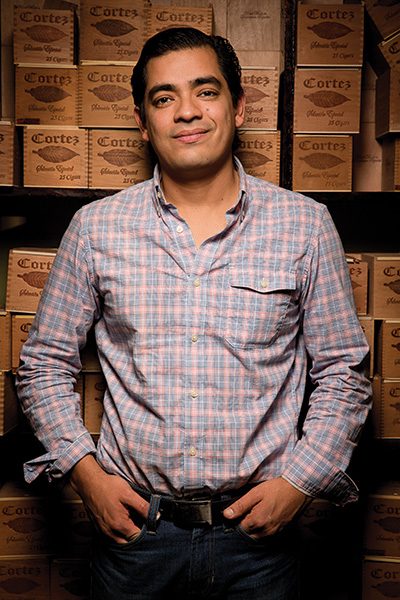
Luis Cortez has been rolling cigars for most of his 32 years. “It was always his passion,” says his wife, Jennifer.
When he isn’t traveling up and down the East Coast giving cigar-rolling demonstrations at corporate meetings, charity events, weddings and the like, he practices his solitary craft in the two-story house on Broad Street (Route 35) in Shrewsbury that also holds his lounge, retail shop and what he calls his “meditation room, where I like to sit and smoke and write down ideas for new shapes and blends.”
A Long Branch resident, Cortez has come a long way from Pinar del Rio, the mountainous westernmost province of Cuba, which produces 70 percent of the country’s celebrated tobacco. He grew up in a family that, on his mother’s side, has been growing tobacco for three generations. In his late teens, he and his brother Christian joined her on a state-sponsored business trip to Nicaragua. They never returned. In 1998 Cortez and his mother moved to Miami, then to New York City in 2003. There he joined General Cigars as “factory ambassador” for its Macanudo brand, visiting East Coast retailers to educate them about its history and craftsmanship.
“The title used to embarrass him,” Jennifer says.
His hands grew restless. Missing the magic of turning bundles of floppy leaves into consumables that connoisseurs covet, he launched his own company, Cortez Cigars (cortezcigars.com), in 2007. Sales have grown 50 percent a year, he says. “Buying online is popular now, but everything we do here is one-on-one,” he explains. “People like hearing the whole process—different tobacco types, fermenting and aging techniques. They enjoy having a local maker. It’s like a revolution.”
Shrewsbury is only part of the enterprise. Once a month, Cortez flies to the Dominican Republic, where he and Christian own a cigar factory. He trains new rollers, buys premium tobaccos, develops new blends. The industry, he says, has recovered slowly from the cigar boom of the 1990s. “So many people wanted cigars, there was a lack of good-enough tobacco, and a lot of new smokers had a bad experience,” he says. “Only a few manufacturers survived.”
Contraction meant that only the best individual craftsmen and growers found work. Quality became the key to survival. Today, Cortez says, “a lot of Dominican, Honduran and Nicaraguan families are using better curing and aging techniques than the Cubans.”
The tobacco arrives at his shop in burlap bales. It has already been aged up to seven years. Cortez packs some of it in 100-year-old barrels that retain the aroma of the whiskey they once held. After two years of barrel aging, he fashions limited-edition cigars and sells them for $7 or $9 each, depending on size. (Most of his cigars are $4 to $5 each.) He himself prefers a corona, a medium-size smoke, but the trend is toward fatter ring gauges, as much as an inch thick. It seems cigars are expanding, much like Cortez’s business.
Click here to read a story about cigar bars around the state.
